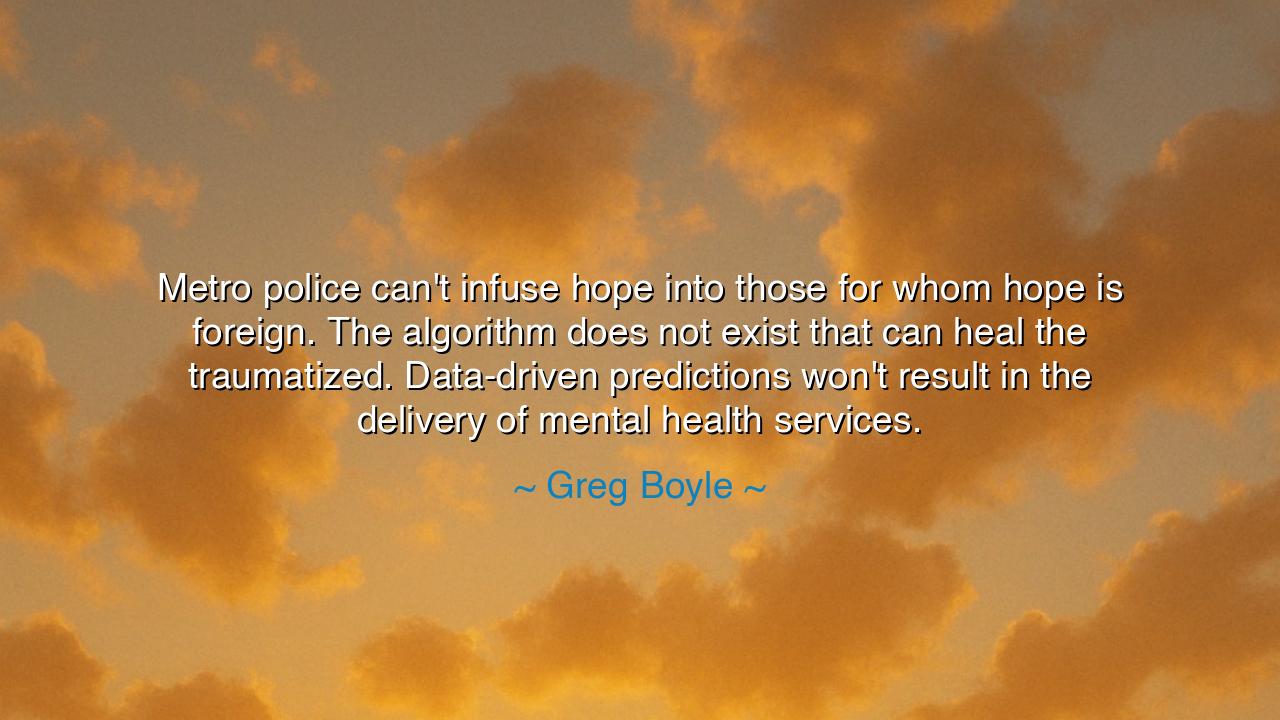
Metro police can't infuse hope into those for whom hope is
Metro police can't infuse hope into those for whom hope is foreign. The algorithm does not exist that can heal the traumatized. Data-driven predictions won't result in the delivery of mental health services.






“Metro police can’t infuse hope into those for whom hope is foreign. The algorithm does not exist that can heal the traumatized. Data-driven predictions won’t result in the delivery of mental health services.” – Greg Boyle
In these words, Greg Boyle, a priest, peacemaker, and founder of Homeboy Industries, speaks not as a critic of progress, but as a guardian of the human spirit. His message pierces through the noise of the modern world, where systems, statistics, and technology often masquerade as solutions to the suffering of the soul. Boyle, who has walked among the broken and the forgotten — gang members, addicts, and the wounded of the streets — knows this truth: that hope cannot be programmed, healing cannot be automated, and love cannot be replaced by data. He reminds us that the deepest needs of humanity can only be met by humanity itself — by presence, compassion, and understanding born from shared pain and grace.
In the first line, Boyle declares, “Metro police can’t infuse hope into those for whom hope is foreign.” He does not condemn law enforcement, but reveals their limitation. The police may maintain order, but they cannot restore meaning. They can restrain the hand, but not redeem the heart. For those who have grown up in despair — whose every day is a war for survival, whose trust in the world has long been shattered — hope is not a language they know. To infuse hope into such hearts is the work of love, not authority; of community, not control. Hope, as the ancients taught, is not imposed — it is grown, like a fragile seed that needs time, care, and light.
The next line strikes even deeper: “The algorithm does not exist that can heal the traumatized.” In an age that worships technology, Boyle’s words are a sacred rebuke. We can measure behavior, predict crime, track movement — yet none of these can touch the inner wound of the human heart. Trauma is not data; it is the echo of pain in the soul. It is the loss of belonging, the fracture of trust, the silent cry for mercy. Healing comes not through equations, but through empathy. The algorithm cannot weep with the sorrowful or listen to the broken; only another human being, with open hands and an unguarded heart, can bring that kind of restoration.
Consider the story of Victor Frankl, the survivor of the concentration camps who found meaning in the midst of horror. Surrounded by death, stripped of dignity, he discovered that hope could endure even when all else was lost — but not through systems or science alone. It came through the flicker of kindness, through connection, through the belief that life still held purpose. His survival was a testament to what Boyle teaches: that no structure, however efficient, can replace the human exchange of compassion. Healing, for both Frankl and Boyle, begins in the sacred encounter between souls.
When Boyle says, “Data-driven predictions won’t result in the delivery of mental health services,” he speaks to the hollowness of solutions that lack the warmth of touch. Numbers may reveal patterns, but they cannot mend despair. The future cannot be predicted into peace. What the traumatized need is not prediction, but presence; not foresight, but friendship. The prophets of old understood this truth — that healing flows not from power, but from love. The teacher does not heal the student by calculation, but by care. The healer does not restore the broken by charting their pain, but by walking beside them through it.
And yet, Boyle’s words are not an attack on progress — they are a plea for balance. He reminds us that while technology can assist, it can never replace the human heart. Data can inform policy, but only empathy can transform lives. The systems of society may guide us toward order, but only compassion builds true peace. The traumatized do not need to be analyzed; they need to be embraced. The heart cannot be healed by machinery, but by mercy — that sacred force which binds humanity together across time, culture, and creed.
Therefore, children of the future, take this wisdom as law: never let efficiency eclipse empathy. In your pursuit of innovation, do not forget intimacy. Speak not only in numbers, but in kindness. Listen to those who suffer; walk among them. See the unseen, and offer not solutions first, but presence. For every wound that breaks a soul, there exists no algorithm that can heal it — only love can do that.
And so, let Greg Boyle’s words endure as a compass for the human age: hope cannot be legislated, love cannot be coded, and healing cannot be automated. The future will belong not to those who build the most powerful systems, but to those who remember the power of the human heart. When we learn again to touch, to listen, and to lift the broken, then — and only then — will we begin to heal the world.






AAdministratorAdministrator
Welcome, honored guests. Please leave a comment, we will respond soon